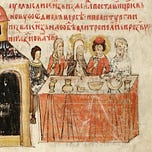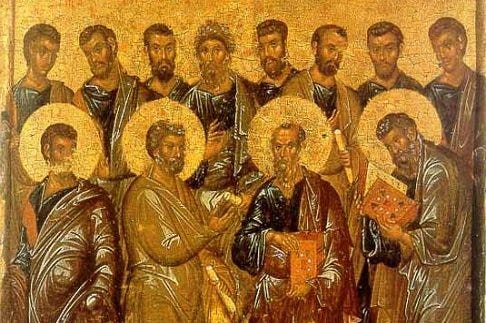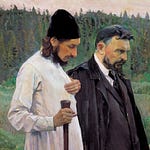The Apostles’ Fast, also called Peter’s Fast, begins on Monday of the week following the week of Pentecost. Because the date of Pentecost depends on the movable date of Pascha, but the end of the Apostles’ Fast is always on the fixed date of the feast of the Apostles Peter and Paul, the length of the fast can vary from 8 to 42 days. (This is different for those on the New Calendar, and their Apostles’ Fast may be completely absent in some years.)
Origins of this fast have little to do with the holy apostles. It is first mentioned in the 3rd century as a compensatory fast for those who could not observe Great Lent. Only later a connection was made between the fast and the apostles. It was proposed that following the descent of the Holy Spirit on the day of Pentecost (see Acts, chapter 2), the apostles fasted in preparation for spreading “their words to the end of the world” (Ps. 19:4). It is not unreasonable to think that they may have indeed fasted. Be that as it may, the Apostles’ Fast gradually became one of the three long public fasts of the whole Church - certainly, by the 9th century.
Metropolitan George of Kiev who arrived there from Byzantium in mid-11th century as “the Metropolitan of Russia” (Greek - Ρωσία), gave the following instruction concerning the Apostles’ Fast:
In Peter’s fast, all [must not] eat meat and no milk at all; but [do] one hundred prostrations a day, except Saturday and Sunday and the Lord’s feasts and [the feast of] John the Forerunner and [that of] the 12 apostles… And I command that no one drink to excess, but eat and drink in moderation, and pray to God at every hour, and to remain in repentance and purity always. In Peter’s fast: on Wednesday and Friday, without cooking and without drink [we] eat once a day; on Tuesday and Thursday and Saturday and Sunday, [we eat] fish twice a day and drink.
В Петрово говейно все ни мяса ясти, ни доива отнюдь, а поклонов до земли сто на день, кроме суботы и недели и Осподских праздник и Богородицы и Иоанна Предтечи и 12 апостол… А упиватися не велю никомуже, но ясти и пити в меру, а к Богу молитися на всяк час, а в покаяньи и в чистоте всегда пребывати. В Петрово же говейно пост: в среду и пяток без варива и без питья одиною днем ясти, во вторник и в четверток и в суботу и в неделю рыбы дважды днем и питие.1
A feast of Metropolitan George (third from left) and Prince Iziaslav I (second from right).
The current edition of the Typikon contains a similar, albeit stricter, instruction in chapter 33:
It should be known: In the fast of the holy apostles … on Tuesday and Thursday [we] do not eat fish but only oil and wine. On Monday, Wednesday, and Friday, [we] eat neither oil nor wine but fast until the 9th hour [3 p.m.] and eat xerophagy on those days. On Saturdays and Sundays, [we] eat fish.
The difference in fasting rules on Tuesdays and Thursdays could be due to an interpretation by Metropolitan George of the rules of the Studite Typikon for the newly-illumined Rus. The Studite rule is as follows (par. 29):
In the forty-day fast of the holy apostles, we do not eat fish or cheese or eggs, except on days when we do not sing the Hour. We eat at the ninth hour [3 p.m.] two dishes - greens with oil and peas without oil; we drink two cups at the ninth hour and two cups in the evening. On feast days when we have appointed to eat cheese and other foods, we eat at the sixth hour [noon] and drink three cups, and two cups in the evening.
In summary, the current rule contained in the Jerusalem Typikon appears to be stricter than either the Studite rule or that of Metropolitan George. It is important to remember, however, that whether one chooses to eat fish on Tuesdays or not, the fast itself consists of not eating any food until a certain hour of the day. Fish, or “greens with oil,” or “peas without oil” - these are the foods with which to break the fast.
As always, last but certainly not least, this is a reader-supported publication; please share it with your friends and family! And if you are saving a lot of money by fasting, please consider becoming a paid subscriber - it is only $5 per month ($4 if you subscribe for a year). To be sure, you may be able to get a bowl of peas without oil for that amount of money; but fish, oil, and five cups of wine will cost far more than the price of the subscription.
Георгий, митр. Киевский «Устав белеческий» или «Заповедь святых отец ко исповедающимся сыном и дщерем.»














Share this post